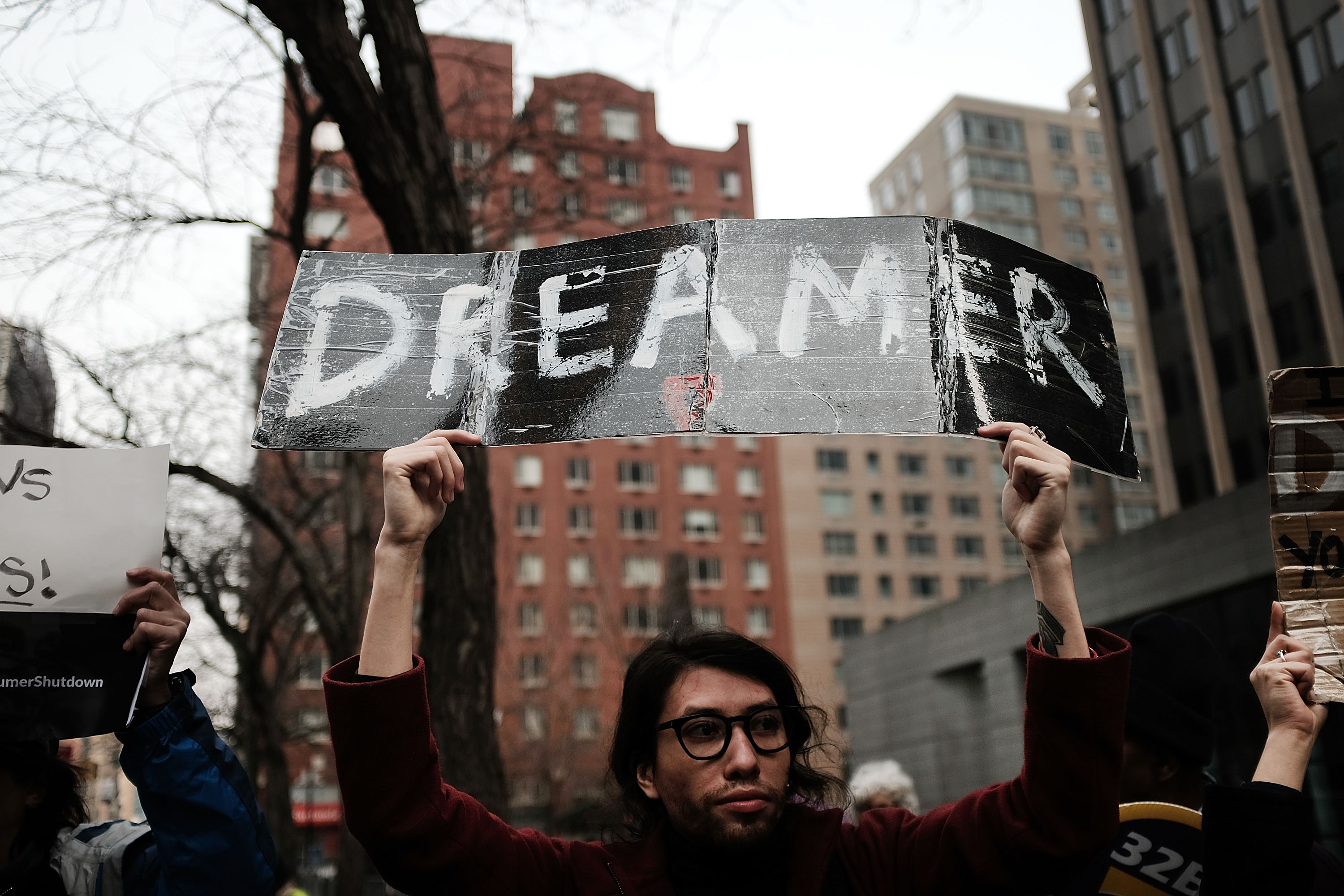Is DACA dead?
Immigration reform seems out of reach. Will Trump really let the DREAMers face deportation?


Yesterday afternoon, President Trump's unpopular, hardline immigration dreams died an embarrassing and comprehensive death in the United States Senate, largely at the hands of his own allies. More importantly, another day of run-of-the-mill congressional dysfunction left recipients of the Deferred Action for Childhood Arrivals (DACA) program, which the president cruelly ended in September, one step closer to mass deportation. With a legislative path to an immigration fix all but closed off, the only real question left is whether Trump will really be willing to oversee the unconscionable expulsion of hundreds of thousands of DREAMers during an election year in which his party is already likely to get routed.
The Senate voted yesterday on four separate measures, all of which failed. One was a bipartisan compromise, worked out in painstaking detail by a group of nearly two dozen senators, including Mike Rounds (R-S.D.), Susan Collins (R-Maine), and Angus King (I-Maine). It would have provided a path to citizenship for the DREAMers as well as hundreds of thousands of others brought to the U.S. as undocumented children. It provided $25 billion for Trump's ridiculous, see-through border wall and placed some modest new restrictions on the ability of DACA recipients to sponsor their parents, but was otherwise to the left of the earlier compromise bill proposed by Sens. Lindsey Graham (R-S.C.) and Dick Durbin (D-Ill.).
This agreement got majority support (enough to move things along in a functioning democratic country, which America is not) but fell short of the 60-vote threshold needed for most legislation in the Senate, not least because Trump was busy railing against it on Twitter while the debate was taking place, calling it a "total catastrophe." Democrats supplied 47 of the 54 votes for a bill that would almost certainly have been vetoed by the president. A dispirited Lisa Murkowski (R-Alaska) blamed "some within the White House that have not yet figured out that legislation almost by its very definition is a compromise product." The dream of a bipartisan immigration framework looks dead, smashed to death on the rocky shoals of the Republican Party's inflexible, anti-immigration monomania, just as it was in 2007 and 2013.
The Week
Escape your echo chamber. Get the facts behind the news, plus analysis from multiple perspectives.

Sign up for The Week's Free Newsletters
From our morning news briefing to a weekly Good News Newsletter, get the best of The Week delivered directly to your inbox.
From our morning news briefing to a weekly Good News Newsletter, get the best of The Week delivered directly to your inbox.
The president's preferred immigration framework fared even worse, going down with only 39 votes. Spearheaded by Iowa Republican Chuck Grassley, it put into actual words Trump's go-nowhere, "four pillars" immigration approach, which would grant a path to citizenship for some 1.8 million undocumented immigrants brought to the U.S. as children in exchange for draconian new anti-immigration measures. It would have eliminated the diversity visa lottery program and family reunification procedures, as well as added new internal security measures. The president's vindictive approach to immigration policy plainly lacks majority support from his own party in the Senate, has no buy-in whatsoever from the voting public, and failed to attract a single Democratic vote. Loved by no one, it too is now dead.
Two other measures, one a narrower bill for the DREAMers minus border security funding, sponsored by John McCain (R-Ariz.) and Chris Coons (D-Del.), as well as Pennsylvania Republican Pat Toomey's punitive sanctuary cities bill, were also defeated and have no future in this Congress. At the end of the day, the Senate had absolutely nothing to show for months of brinksmanship, back-room negotiation, and difficult compromise-making. The agent and architect of this dysfunction, at least in the Senate, is the president himself, whose stubborn refusal to accept a compromise that would get him his dumb wall and a clear political win has painted him and his entire party into an uncomfortable corner.
Congress is now nearing the end, one way or another, of a crisis set into motion by the president's desire to increase his leverage on a signature issue rather than seek the most humane and responsible outcome for vulnerable human beings. Trump, rather than eliminating the DACA program in September, could have let the contested process play itself out in the judiciary, which is where it has ended up anyway. Two recent court decisions have halted Trump's DACA reversal, at least for now, which the president could either have used as political cover to avoid the wrath of his nativist supporters or as an excuse to grudgingly sign a compromise that would have sent senior policy adviser Stephen Miller and Chief of Staff John Kelly home weeping into their America First mugs.
Instead, he gambled that creating a deadline for the DREAMers would put unbearable pressure on his Democratic adversaries to make a deal more to his liking than the "clean" DREAM Act favored by progressive activists. And even his most ardent critics must admit that this strategy paid some Machiavellian dividends: The president ultimately succeeded in convincing almost every Democratic senator to reverse course, risk backlash from key supporters, and vote for a bill that would provide billions of dollars for a wall that will never get built in exchange for the moral imperative of rescuing the DREAMers. He won.
A free daily email with the biggest news stories of the day – and the best features from TheWeek.com
But President Trump is a hopeless figure, unversed in the details of policy, unfamiliar with the drop-dead negotiating parameters of the opposition, and unwilling or unable to take the best deal that will ever be offered to him by this Congress. Whoever has his ear right now on this policy is either delusional or actually wants to do him political harm. Just weeks after routing rudderless Democrats in the brief shutdown fiasco, and operating at what might be the peak of his miserable popularity and limited leverage, the president simply could not accept his fellow poker players folding their cards to him. What he does with it now is anyone's guess, but it is possible that the man can't recognize the rules and incentives of anything other than golf, a game that you play by yourself.
One plausible scenario since the very beginning of this artificial crisis has been that Trump will simply re-institute the DACA program when it becomes clear that Congress will not or cannot come to an agreement. If that seems crazy to you, imagine the political price that the GOP will pay if DREAMers start getting deported en masse this summer, months before the midterm elections. Think of the headlines. Remember, the American people support a path to citizenship for DREAMers by a 52-point margin. Republicans are running 12 points behind Trump's numbers in pretty much every contested election that has been held in America since the beginning of 2017. And Trump's numbers were not that great to begin with.
Of course, trying predict what America's senescent president will do from one moment to the next is a fool's errand. All we know right now is that President Trump has exhausted all paths to a hardline immigration overhaul, the lives of the DREAMers hang precariously in the balance, and Democrats will yield no more than they already have. It's like a poker game in which everyone has pushed their chips to the middle of the table and revealed their cards to the other players.
Except with the lives of millions of innocent people at play.
David Faris is a professor of political science at Roosevelt University and the author of "It's Time to Fight Dirty: How Democrats Can Build a Lasting Majority in American Politics." He's a frequent contributor to Newsweek and Slate, and his work has appeared in The Washington Post, The New Republic and The Nation, among others.
-
 Bari Weiss’ ‘60 Minutes’ scandal is about more than one report
Bari Weiss’ ‘60 Minutes’ scandal is about more than one reportIN THE SPOTLIGHT By blocking an approved segment on a controversial prison holding US deportees in El Salvador, the editor-in-chief of CBS News has become the main story
-
 Has Zohran Mamdani shown the Democrats how to win again?
Has Zohran Mamdani shown the Democrats how to win again?Today’s Big Question New York City mayoral election touted as victory for left-wing populists but moderate centrist wins elsewhere present more complex path for Democratic Party
-
 Millions turn out for anti-Trump ‘No Kings’ rallies
Millions turn out for anti-Trump ‘No Kings’ ralliesSpeed Read An estimated 7 million people participated, 2 million more than at the first ‘No Kings’ protest in June
-
 Ghislaine Maxwell: angling for a Trump pardon
Ghislaine Maxwell: angling for a Trump pardonTalking Point Convicted sex trafficker's testimony could shed new light on president's links to Jeffrey Epstein
-
 The last words and final moments of 40 presidents
The last words and final moments of 40 presidentsThe Explainer Some are eloquent quotes worthy of the holders of the highest office in the nation, and others... aren't
-
 The JFK files: the truth at last?
The JFK files: the truth at last?In The Spotlight More than 64,000 previously classified documents relating the 1963 assassination of John F. Kennedy have been released by the Trump administration
-
 'Seriously, not literally': how should the world take Donald Trump?
'Seriously, not literally': how should the world take Donald Trump?Today's big question White House rhetoric and reality look likely to become increasingly blurred
-
 Will Trump's 'madman' strategy pay off?
Will Trump's 'madman' strategy pay off?Today's Big Question Incoming US president likes to seem unpredictable but, this time round, world leaders could be wise to his playbook



